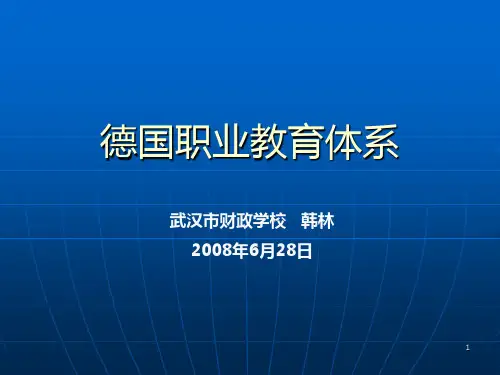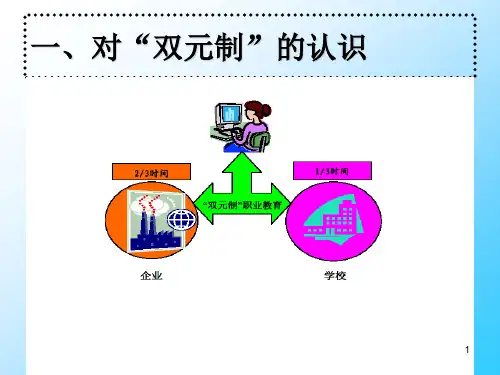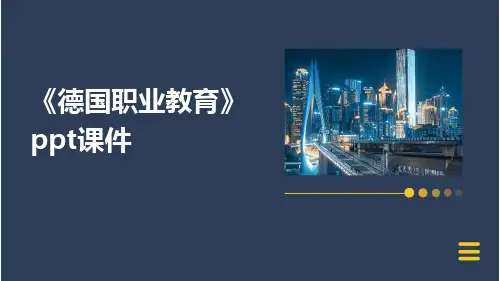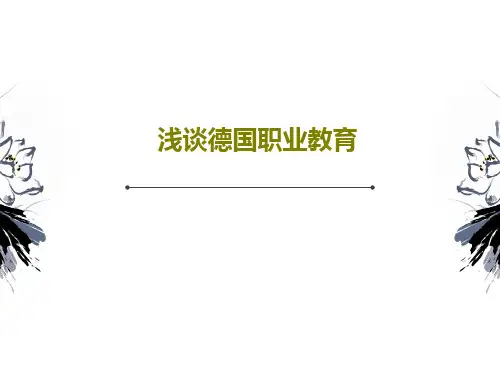- 1、下载文档前请自行甄别文档内容的完整性,平台不提供额外的编辑、内容补充、找答案等附加服务。
- 2、"仅部分预览"的文档,不可在线预览部分如存在完整性等问题,可反馈申请退款(可完整预览的文档不适用该条件!)。
- 3、如文档侵犯您的权益,请联系客服反馈,我们会尽快为您处理(人工客服工作时间:9:00-18:30)。
• •
Research, Human Resources Development, Production Engineering Dr. B. Diegner, Q-China 2010
20/9/10 Folie 2
Who is ZVEI ?
•
German Electrical and Electronic Manufacturers‘ Association
• New technologies, new employment fields new qualification challenges!
Flexibility is what companies need
• Broad qualification profiles, wholistic acting competences, open training structures, openness to new developments
Professional competence for company‘s demand is the central aim
• Carry out concrete tasks, fill concrete orders, run and optimize production and service processes, cooperate with neighboring departments
20/9/10 Folie 7
Reasons why companies are willing to offer training
Source: BMBF
Research, Human Resources Development, Production Engineering Dr. B. Diegner, Q-China 2010
20/9/10 Folie 1
Content
• •
Very shortly: Who is ZVEI? What is the dual system of vocational training? How does it work? Why in-company vocational training? The modern way of vocational training in the electrical and electronics industry
•
ZVEI represents approx. 80% of the sector in terms of turnover and employee numbers
20/9/10 Folie 3
Research, Human Resources Development, Production Engineering Dr. B. Diegner, Q-China 2010
4-3 days per week*
Chamber of commerce and industry:
Examinations
* 5 days working week
Research, Human Resources Development, Production Engineering Dr. B. Diegner, Q-China 2010
State:
Standardized framework
Industry:
Industrial environment
Vocational School:
General education and specialized instruction 1-2 days per week*
Company:
Practice-related training
New professions, designed by modern principles, taught in modern ways of training and examination: Business processes define professions, and ways and contents of training
20/9/10 Folie 13
Research, Human Resources Development, Production Engineering Dr. B. Diegner, Q-China 2010
Work processes and challenges typical for the profession
• •
Pacemakers of technical progress, with key technologies decisively influencing innovation and growth in virtually all sectors of the economy Figures 2009:
Research, Human Resources Development, Production Engineering Dr. B. Diegner, Q-China 2010
The VT based on „old“ (1987‘s) electrical professions had not kept pace.
Consequently, the numbers of training contracts in the traditional professions constantly decreased. Young people were no longer interested, companies offered VT in neighboring fields (IT professions, mechatronics).
The dual system of vocational training in Germany
and the modern electrical and electronics professions in industry
Dr. Bernhard Diegner, ZVEI e.V.
Research, Human Resources Development, Production Engineering Dr. B. Diegner, Q-China 2010
20/9/10 Folie 11
New professions for the electrical and electronics industry – why?
The industry changed – the professions had to follow! In the 1990‘s, the electrical and electronics industry underwent fundamentalch, Human Resources Development, Production Engineering Dr. B. Diegner, Q-China 2010
20/9/10 Folie 4
The Dual System: Partners and their contributions
Time for new professions had come!
Research, Human Resources Development, Production Engineering Dr. B. Diegner, Q-China 2010
20/9/10 Folie 12
Basic design principles of the new electrical and electronics professions 2003
Connection between ZVEI and the dual system of vocational training
•
Qualified workforce is the backbone of a hightech industry. Representing a hightech industry, ZVEI is actively engaged in matters of human resources development. Activities of ZVEI include questions of engineering studies as well as vocational training and further training for both engineers and technicians. For decades now, based on it‘s specific experience, ZVEI represents the employer‘s side in the development of new professions for the electrical and electronics industry within the dual system. We are convinced: The best way of vocational training is the dual system.
• • • • Employees in Germany: Employees in German companies abroad: Turnover: of which from foreign customers: R&D spending; ≈ 810,000 ≈ 600,000 145.0 bn € (2008: 182 bn €) 67.8 bn € (=46,5%) 10.4 bn €
• • • Increasing importance of process based work forms (new disruptive technologies, IT, new business and organizational challenges, quality management systems, …) Increasing complexity and networking of technologies Increasing importance of customer related services





